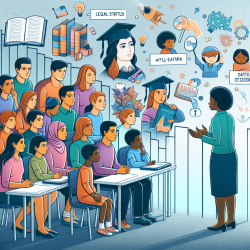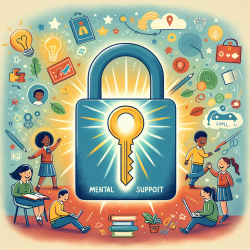Introduction
In the field of speech-language pathology, practitioners are often tasked with supporting diverse populations, including undocumented students who face unique challenges in educational settings. The research article "Dreams Delayed: Barriers to Degree Completion among Undocumented Community College Students" by Veronica Terriquez offers valuable insights that can inform practitioners in enhancing their skills to better support these students. By understanding the barriers faced by undocumented students, practitioners can develop strategies to help mitigate these challenges and improve educational outcomes.
Understanding the Challenges
According to Terriquez's research, undocumented students face significant barriers that impact their ability to maintain continuous enrollment in community colleges. These barriers include financial hardships, sub-standard employment options, and excessive stress due to their precarious legal status. The study highlights that undocumented students are more likely to "stop out" or temporarily withdraw from college, which negatively affects their chances of degree completion.
Data-Driven Insights
The study employs a mixed-methods approach, utilizing survey data and semi-structured interviews to explore the non-continuous enrollment patterns of undocumented students. Logistic regression analysis reveals that undocumented students have disproportionately high rates of stopping out compared to their peers. This data-driven insight underscores the importance of addressing the unique challenges faced by this population to improve their educational outcomes.
Strategies for Practitioners
Practitioners can leverage the findings from this study to enhance their support for undocumented students. Here are some strategies to consider:
- Financial Counseling: Assist students in navigating financial aid options and scholarships that may be available to them, even if they are undocumented.
- Stress Management: Provide resources and support for managing stress, including access to mental health services and stress-reduction workshops.
- Career Guidance: Offer guidance on employment opportunities that do not require legal documentation, helping students find work that aligns with their skills and interests.
- Advocacy and Awareness: Advocate for policies that support undocumented students and raise awareness about their challenges among educators and policymakers.
Encouraging Further Research
While Terriquez's study provides valuable insights, there is a need for further research to explore the long-term impacts of legal status on educational outcomes. Practitioners are encouraged to engage in research initiatives that examine the effectiveness of interventions designed to support undocumented students. By contributing to the body of knowledge, practitioners can help shape policies and practices that promote equity and access to education for all students.
Conclusion
Undocumented students face numerous barriers that hinder their educational success. By understanding these challenges and implementing data-driven strategies, practitioners can play a crucial role in supporting these students and improving their educational outcomes. To read the original research paper, please follow this link: Dreams Delayed: Barriers to Degree Completion among Undocumented Community College Students.










